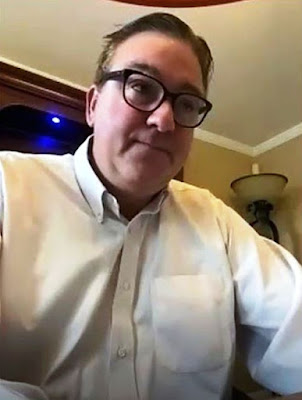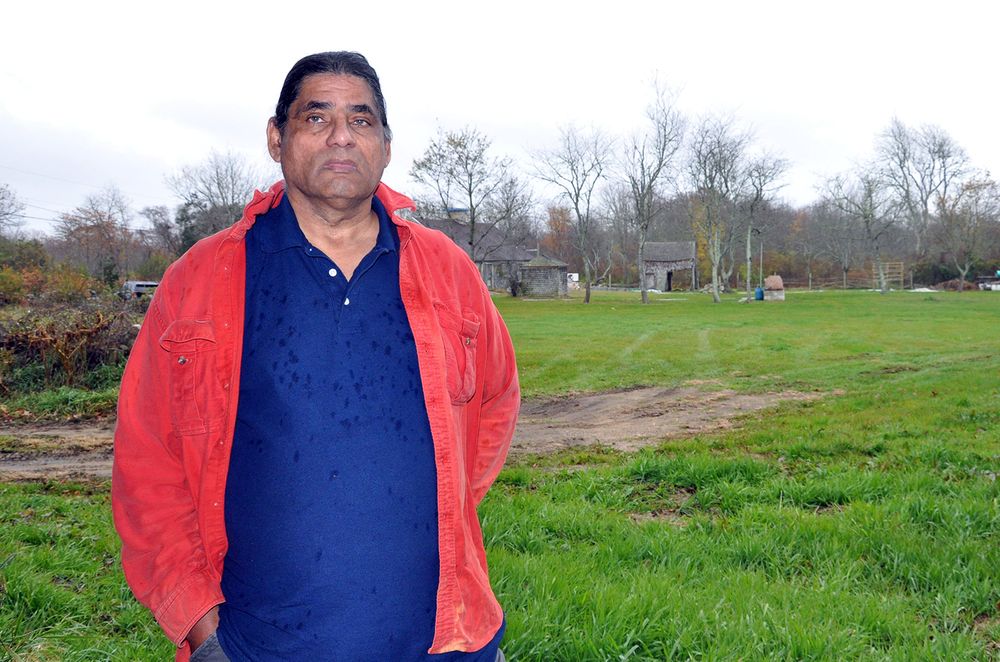Alex
Nunes, The Public's Radio
Late
last year, former Narragansett Indian Tribe First Councilman Randy Noka stood
in a clearing on 32 acres of land in the Charlestown woods. He said if you want
to know what he thinks of the town and its solicitor for Indian affairs, visit
this spot where 12 small homes remain abandoned. The
property was supposed to be affordable housing for elderly members of the
tribe. Today, you see overgrown grass and buildings with smashed in windows.
For Noka, it’s heartbreaking. “You
can see the condition of them,” Noka said. “It's a deplorable condition. And
just as bad, if not worse, is the reason why.” The
details of this case may sound familiar. The property was at the heart of a
years-long jurisdictional battle between the tribe and the town and state that
went all the way to the U.S. Supreme Court. Ultimately, a majority of justices
ruled against the tribe’s effort to place the land in federal trust and beyond
local and state laws, finding that the Narragansetts didn’t qualify because the
tribe wasn’t federally recognized in 1934 when a U.S. law outlined trust
rules. After
the ruling, Charlestown still wouldn’t allow the housing project to be
completed through its approval process, because the Narragansetts wouldn’t sign
away sovereign immunity shielding them from legal action should they someday
decide to build something else on the land. “So
they let this happen,” Noka said of town officials. “It never did go into trust
and maybe never will. But you could have allowed the project to go forward, let
the tribe finish it, let the private landowner–don't even have to put the tribe
there for the sake of an example–let the private landowner move forward.
There's projects all over this place.” The
attorney at the center of the legal dispute on the town’s behalf was Joe
Larisa. The Narragansett Indian Tribe has its headquarters and about 1,800
acres in Charlestown, more land than anywhere else in the state. And Larisa has
been around for nearly two decades as the town’s solicitor for Indian
affairs. Larisa
defends his position, saying in an interview that the job is about “facing the
reality that we're the only town with a sovereign nation within our
borders.” He
continued, “Because of that, the town needs to be aware of its legal rights on
every matter involving the tribe.” 👈 Charlestown Solicitor for Indian Affairs Joe Larisa is pictured in a video interview. Larisa
got his start opposing the tribe at the state level, working against a
potential Narragansett casino in the 1990s and early 2000s for two separate
governors. In
Charlestown, he’s worked on civil rights cases involving town police and tribal
members, issues stemming from the state’s infamous raid on a tax-free
Narragansett smoke shop, and a more recent land transfer from the state to the
tribe that fell through because of disagreements over tribal rights related to
the land. Larisa also represents a public library in
Jamestown that wants to build on land the Narragansetts say is a sacred burial
site. “He's
solicitor for Indian affairs issues, or fight-the-Narragansett-Tribe issues,”
Randy Noka said. “To put it in my own words: ‘Any Indian that isn't benefiting
because he's Indian, because he's Narragansett–any rights the Narragansett
don't get because here I am, the Great Indian Slayer Joe Larisa, then good for
me, good for the town of Charlestown.’" In
the last year, some town leaders have raised questions about Larisa’s
arrangement with Charlestown. Town Council President Deb Carney is one of two
council members who voted against renewing his contract in 2021. “What
we’re doing is we're retaining an attorney specifically against a group of
people, and I don't think that's right,” Carney said. “We don't do that, nor
should we do that, with any other group.” Carney
and the other councilor who voted no, Grace Klinger, questioned the expense of
Larisa’s contract. Currently, Larisa gets a retainer of $2,000 dollars a month
regardless of how much work he does, plus $130 dollars an hour for additional
litigation work. Carney takes her criticism a step further. She says Larisa’s
position, as it’s currently structured, is “a bit racist.” “We’re
discriminating against one group of people,” she said. “We've separated the
Narragansetts and said, ‘We're going to keep somebody on retainer just for
every issue involving them.’” Town
Councilor Bonnie Van Slyke disagrees with that. Van Slyke, joined by council
members Cody Clarkin and Susan Cooper, approved Larisa’s contract. She says the
town solicitor for Indian affairs position is necessary and does not target the
Narragansetts. “They
are our neighbors. They're very special neighbors,” Van Slyke said. “It's a
matter of respect to understand what the basis is that we're dealing with these
various jurisdictional issues. We need consistent, up to date advice on what
these issues are and how to act, how to deal with them.” Central
to the solicitor’s position is the question of Narragansett land sovereignty
and the possibility that Congress may someday pass legislation that could
effectively nullify the 2009 Supreme Court decision and allow the Narragansetts
to place land in federal trust without restrictions. That’s why a big part of
Joe Larisa’s job is monitoring developments in Washington, D.C. and maintaining
lines of communication with the governor’s office should a change in status be
on the table. “If
the tribe gets land in federal trust, unrestricted, it'd be ‘Indian country,’”
Larisa said. “And when you have ‘Indian country,’ the land is largely exempt
from state laws, state civil laws, state criminal laws, and town ordinances. It
means they can largely do what they want, just like a sovereign nation within
our borders.” Larisa
added, “Square one is it opens the door a crack to a casino again. It could
open the door to other activities that would be illegal under town law or state
law.” But
members of the tribe say that’s fear-mongering. Narragansett
Indian Tribe Medicine Man John Brown is pictured at the tribe's farm in
Westerly.ALEX NUNES - THE PUBLIC'S RADIO
With
the amount of legal gambling in the region already, Narragansett Indian Tribe
Medicine Man John Brown says a casino isn’t even a viable business opportunity
today. He also points out that the Narragansetts own property in multiple
states, including several hundred acres in Westerly, where the tribe’s
relationship with town officials has been much more positive. Consider also
that, in Connecticut, the state’s two federally recognized tribes have land in
federal trust, and the towns they’re located in don’t have solicitors for
Indian affairs. “There's
this unnecessary fear of what we're going to do and how we're going to do it,”
Brown said. “When you look at our lands and you look at the lands around us,
it's not us that's overbuilt on our property. It's not us that’s fouled our
waters. It's not us that’s fouled the air. We are a natural people, and we
maintain the things that we have in natural or close to natural existence.” Joe
Larisa’s contract as Charlestown solicitor for Indian affairs has no end date
on it and will next come up for discussion when the town council chooses to revisit
it. So far, it has not. Alex
Nunes can be reached at anunes@thepublicsradio.org. LISTEN
to the 8-minute broadcast here: https://soundcloud.com/user-911967060/in-charlestown-critics-say-special-solicitor-position-is-discriminating-against-one-group-of-people |


